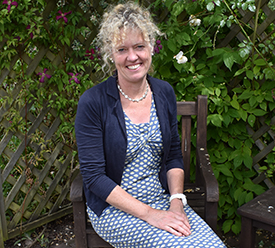Notcutts double offer to train ten students at Thrive
 |
 A new training bursary has been created at Thrive thanks to a touching and generous donation in the name of the late Charles Notcutt who passed away in 2015 aged 81. A new training bursary has been created at Thrive thanks to a touching and generous donation in the name of the late Charles Notcutt who passed away in 2015 aged 81.
Mr Notcutt, OBE, was an inspirational and popular leader of the horticultural community and was instrumental in the rapid growth of the family firm, Notcutts.
The Charles Notcutt Memorial Bursary was launched in January 2016 to enable five students to complete our Award in Social and Therapeutic Horticulture.
More than 50 people applied for the bursary and Thrive shortlisted ten excellent candidates – in light of that Notcutts has agreed to fund all ten places.
The Award combines two days of teaching with an eight week period of accompanied self-directed learning. The bursary will cover the cost of ten places on our specialist knowledge programme, followed by access to the Award assignment. The ordinary combined cost of this is £550.
Thrive is the leading charity in the UK that uses gardening to help people living with disabilities or ill health, or those who are isolated, disadvantaged or vulnerable, at their four regional centres and in the community, by using plants and gardening to bring positive changes to their lives.
If you have ever marvelled at the beauty of a flower, felt that sense of excitement, then satisfaction as your seedlings start to grow or feel refreshed and rejuvenated after a long walk in nature, then you have directly experienced some of the founding principles that have given rise to the profession of social and therapeutic horticulture (STH) which Thrive is the leading authority on in the UK.
As well as helping hundreds of people each year, the charity plays an important role in training people from a wide range of backgrounds, including health, social care and horticulture or people who are looking for a new career.
Damien Newman, Thrive’s National Training, Education and Consultancy Manager, said: “More and more people from different backgrounds are deciding to embark upon a new career in social and therapeutic horticulture.
“We offer ‘Step into Social and Therapeutic Horticulture’ workshops that provide a great introduction and provide careers advice and connect people with opportunities to volunteer.
“And Thrive can help people who want to take their training further, or become professional horticultural therapists, to study courses that we run in collaboration with Coventry University and Pershore College. In total around 700 people access our training programme each year.”
Charles’ daughter Caroline (pictured) , who was one of the judges of Thrive’s annual flower show in July, presented the charity with a cheque and was delighted to hear of the connection with Pershore College which is where her father studied.
Looking to the future, Damien describes horticultural therapy movement as being “on the crest of a wave” and as it continues to gain credibility as a proven, cost-effective treatment that could help vulnerable people with a range of support needs and save the NHS millions of pounds each year, it is little surprise that the interest of the medical profession has once again been aroused.
There are currently around 11.9 million living with a disability in the UK. In order to ensure that many more can experience the benefits of gardening for health and well-being, Thrive believes it is essential that a new generation of professionals and practitioners are equipped with the skills and knowledge required to offer credible, high quality therapy sessions across the UK.
Damien added: “Thrive, alongside others in Green Care, the National Gardens Scheme who recently commissioned a report by The King’s Fund; Gardens and Health: Implications for policy and practice, the Horticultural Trades Association and RHS have been promoting gardening for health and wellbeing, making connections with the medical profession and trying to get Public Health to recognise the value of Horticulture for health and wellbeing.
“More calls for doctors to ‘prescribe gardening’ mean we could see a huge demand for people who have knowledge of horticulture and have been trained to use horticulture as a therapy in the coming years.”
For more information about Thrive and the training opportunities they offer visit www.thrive.org.uk
 |
|